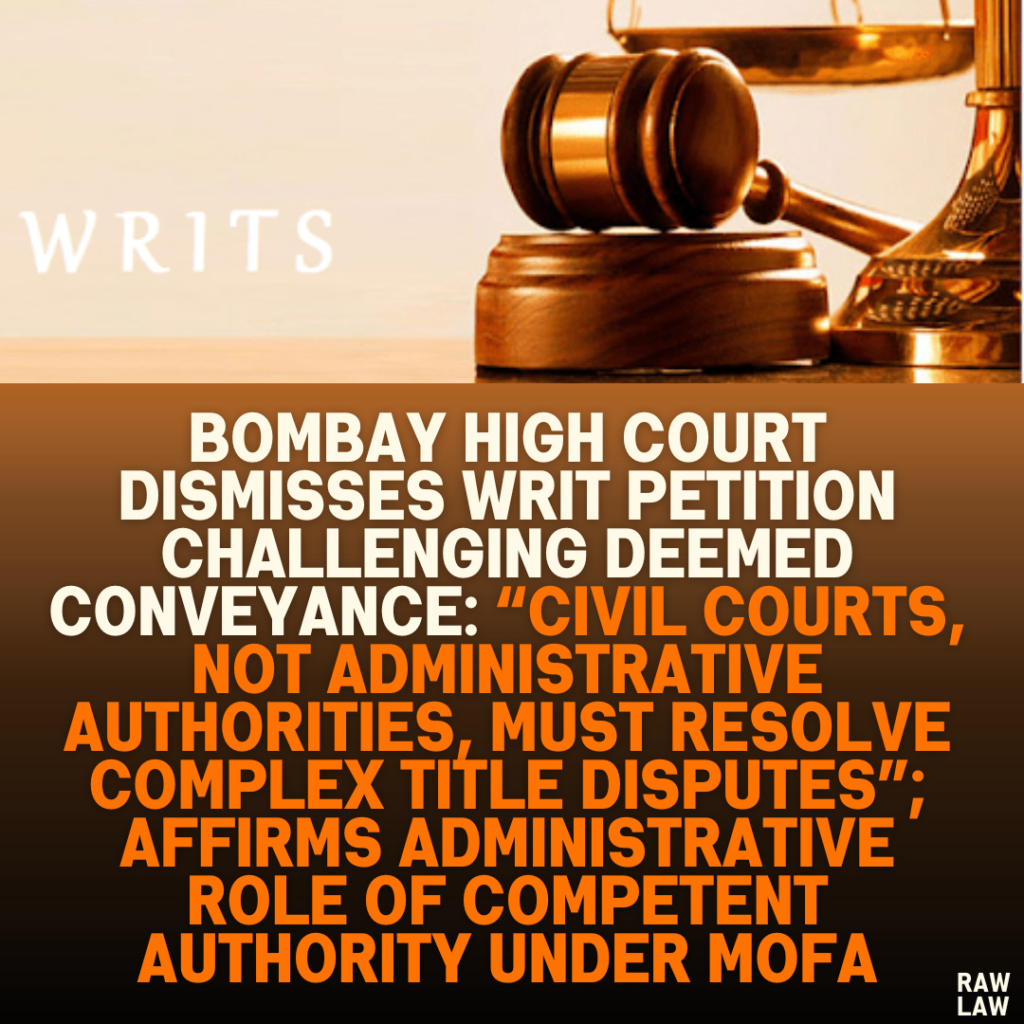Court’s Decision:
The Bombay High Court dismissed a writ petition filed by a developer challenging the deemed conveyance granted to a cooperative housing society under Section 11 of the Maharashtra Ownership Flats Act, 1963 (MOFA). The court ruled that:
- The Competent Authority’s role is administrative and limited to ensuring statutory compliance under MOFA.
- Complex issues of title, residual Floor Space Index (FSI), and proprietary rights must be adjudicated in civil courts, not through summary proceedings under MOFA.
- The petitioner’s grievance regarding the extent of land conveyed could only be resolved by filing a civil suit.
Facts:
- The Dispute: The dispute arose when the Competent Authority granted deemed conveyance for a land area of 13,718.26 sq. meters and construction of 12,048.83 sq. meters to the cooperative housing society (respondent No. 2). This was challenged by the petitioner, a developer and promoter of the project.
- Development and Discrepancy: The society was formed by flat purchasers based on a sanctioned plan dated December 24, 2010. This plan allowed for six wings comprising 219 units, using an FSI of 12,086.87 sq. meters. However, the petitioner revised the sanctioned plan in 2014 without the society’s consent, intending to build additional wings.
- Pending Civil Suit: The society had earlier filed a civil suit seeking specific performance of the agreement, challenging the revised plans as illegal, and seeking an injunction against the petitioner’s attempt to utilize additional FSI.
- Petitioner’s Defense: The petitioner argued that the society had agreed to a phased development and the project was incomplete, making the deemed conveyance application premature.
Issues:
- Whether the Competent Authority had jurisdiction to grant deemed conveyance amidst pending issues of title and ownership in the civil suit.
- Whether the petitioner’s reliance on a Memorandum of Understanding (MoU) allowed it to utilize residual FSI for further development.
- Whether the Competent Authority’s decision ignored statutory guidelines or violated procedural fairness.
Petitioner’s Arguments:
- Lack of Jurisdiction: The petitioner contended that the Competent Authority could not grant deemed conveyance while a civil suit addressing overlapping issues of title, ownership, and contractual obligations was pending.
- Premature Application: They argued that the project’s phased development was incomplete, and conveyance could not be executed until all buildings were constructed, as mutually agreed.
- Residual FSI Rights: The petitioner relied on an MoU with the society, which it claimed permitted the use of residual FSI through Transferable Development Rights (TDR) to complete the project.
- Statutory Oversight: The petitioner accused the Competent Authority of failing to consider government resolutions mandating proportionate conveyance for completed structures only.
Respondent’s Arguments:
- Statutory Compliance: The society argued that they were entitled to deemed conveyance under the sanctioned plan of 2010, which the petitioner had violated by revising without their consent.
- Exhausted FSI: The petitioner had already consumed the FSI in constructing four buildings. Consequently, any claim to residual FSI or further development rights was invalid under MOFA.
- Informed Consent: The reliance on the MoU was flawed, as it lacked the statutory requirement of “informed consent” from flat purchasers, violating Section 7 of MOFA.
- Independence of MOFA: Pending civil disputes do not affect the statutory right to deemed conveyance under MOFA.
Analysis of the Law:
- MOFA’s Purpose: The court noted that MOFA ensures flat purchasers’ rights by obligating promoters to convey title once statutory conditions are met. This protects purchasers from delays and arbitrary revisions by developers.
- Role of Competent Authority: Under Section 11 of MOFA, the Competent Authority’s jurisdiction is administrative. It enforces pre-existing obligations of promoters but cannot adjudicate title disputes or interpret complex contractual terms.
- Informed Consent Doctrine: Section 7 of MOFA mandates explicit and voluntary approval by flat purchasers for any deviations from the original plan. The court highlighted that:
- Blanket consent clauses in agreements are insufficient.
- Non-disclosure of material changes (e.g., phased development or residual FSI) invalidates the promoter’s claims.
- Pending Civil Suits: The court clarified that statutory rights under MOFA operate independently of civil disputes. Title disputes or overlapping issues must be resolved in civil courts.
Precedent Analysis:
- Dosti Corporation Case: The court held that promoters cannot justify deviations from sanctioned plans through generic consent clauses without fully informing flat purchasers.
- Zainul Abedin Case: This case emphasized that deemed conveyance orders do not confer title but operationalize statutory duties. Title disputes remain within civil courts’ exclusive jurisdiction.
- Shimmering Heights Case: The court reiterated that administrative authorities cannot adjudicate property ownership issues.
Court’s Reasoning:
- The Competent Authority properly exercised its administrative powers under MOFA by granting deemed conveyance based on the sanctioned plan.
- The petitioner’s reliance on incomplete project development was unfounded since the society had complied with statutory prerequisites.
- Disputes over residual FSI, phased development, and additional wings constituted complex title disputes requiring evidence-based adjudication in civil courts.
Conclusion:
- The writ petition was dismissed. The Competent Authority’s order was upheld as legally valid under MOFA.
- The petitioner was granted liberty to file a civil suit to address grievances about the deemed conveyance or residual FSI rights.
- Observations made by the court were confined to the legality of the Competent Authority’s order and would not prejudice civil proceedings.
Implications:
- Clarifies MOFA’s Scope: This judgment reaffirms that the Competent Authority’s role is administrative and limited to enforcing statutory duties under MOFA. Complex disputes over title or ownership must be resolved in civil courts.
- Protects Purchasers’ Rights: The judgment underscores MOFA’s intent to safeguard flat purchasers from arbitrary delays and non-compliance by developers.
- Guidance for Promoters: Developers must fully disclose all project details, including FSI and phased plans, at the agreement stage to avoid disputes.




Pingback: Kerala High Court Discharges Petitioners: Observes "Mere Allegations Without Supporting Evidence Cannot Sustain Charges" and Quashes Baseless Charges Under Section 239 Cr.P.C. Due to Lack of Evidence - Raw Law